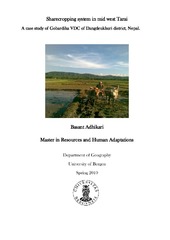Sharecropping system in mid west Tarai. A case study of Gobardiha VDC of Dangdeukhuri district, Nepal.
Master thesis
Permanent lenke
https://hdl.handle.net/1956/5316Utgivelsesdato
2010-05-18Metadata
Vis full innførselSamlinger
- Department of Geography [627]
Sammendrag
This study attempts to assess sharecropping system, its impact on farming practices and institutional impact on peasants' access to land resource in dang, west Nepal. Data have been collected using questionnaire survey, group discussions and interviews with landlords and peasants during May 2009 to July2009. The study shows that sharecropping system has emerged as the result of unequal land holding, especially due to marginalization of some Tharu peasants and accumulation of land to few landlords more than they can husband themselves. This inequality can be traced back to the feudal structure of country and autocratic regime of Rana until mid 20th century. Despite different land reform Act and policies, which aims to ensure poor peasants‘ access to land, during democratic era later on, state fails to achieve significant perceptible outcomes since the feudal structure of society has not been completely transformed and policy implementation have been failed to deal with associated different formal and informal local institutions and long existing unequal power relations that maintain unequal land distribution and 'feudal mode of production'. Consequently, sharecropping system has been continued as the ultimate livelihood option for the landless and poor marginalized peasants. The study also reveals that sharecropping system has not brought any significant changes in farming practices. Despite its contribution on livelihoods, it highly disadvantages the poor tenants in terms of unpaid labour and negotiations of share of crop output. Access to sharecropping is also mediated by local practices and different macro to micro level institutions, making poor tenants more vulnerable.
